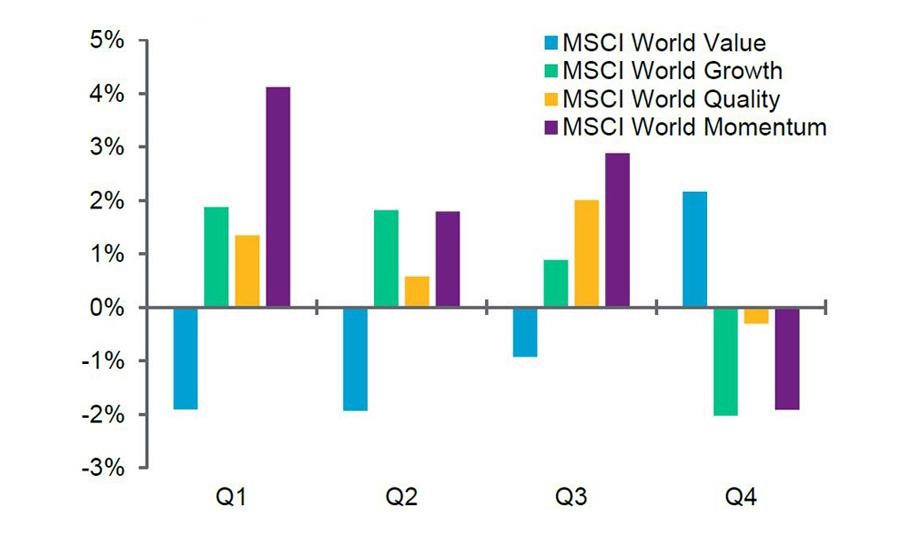The benefits of a multi-manager approach
While all investors claim to remain focused on delivering long term results, a volatile period like what we experienced in 2018 leaves most investors feeling battered and bruised. Last quarter proved to be a notable example of the increasingly common turbulence global capital markets are faced with as both the equity and bond market experienced heightened volatility – escalating trade tensions, monetary policy tightening, unresolved political issues in the European Union, and slowing growth in a number of economies have all cast a shadow on the global market picture.
At Willis Towers Watson, we are strong believers in being long-term, as well as the benefits of a multi-manager approach in navigating a portfolio through unpredictable times. Investment managers will view and react differently to market conditions, and as a result, their performance could vary significantly.
For example, and as illustrated in the chart below, the first three quarters of 2018 saw significant variation in performance by style; growth styles were in favour for much of these nine months, while value managers typically lagged the benchmark. There was also significant outperformance for most of the period from large cap stocks. But the fourth quarter saw a rotation from a style perspective, with managers focusing on companies with strong quality characteristics being ahead of the benchmark, whereas managers that invest in companies expected to generate strong growth have in general been underperforming. We believe a solid equity portfolio’s role is to smooth out these swings in style achieved through diversification and therefore deliver a more consistent and less bumpy relative return pattern when assessed over time.
2018 quarterly relative performance (MSCI style factor returns vs MSCI World Index)

Source: MSCI, as at 31 December 2018.
Stepping into 2019, most specialists predict global equity returns to be lower over the near future and volatility is expected to increase due to low global growth expectations and continued geopolitical angst. While this paints a gloomy backdrop for equities, we remain optimistic and feel there are attractive opportunities ahead, but that asset owners need to take action in order to position themselves correctly, for whatever is to come. Most importantly, we encourage asset owners to continue thinking about their equity allocation in aggregate and whether they have enough active manager diversification in their overall equity portfolio.
We recognise that not all investment styles will be favoured over 2019. However, we believe that having a line-up of talented managers who have very different investment approaches and styles allows us to build a portfolio that is incredibly robust across the entire market cycle and that reacts well to a variety of conditions. Hence avoiding the reliance on a single manager or style to drive performance.
Our approach to equity investing allows each underlying manager to deliver a differentiated strategy that focuses solely on their best 10 to 20 stock ideas. Combining these mandates to reduce factor biases relative to the benchmark, such as style, sectors, geography and market capitalisation, can help ensure the total portfolio does not have a significant bias to any one of these factors and relative performance is expected to be driven by the underlying managers’ stock picking capabilities.
Despite recent market volatility and uncertainty, we expect this equity investing approach to be able to perform well in both up and down markets over the long term.
The contents of this article are for general interest. No action should be taken on the basis of this article without seeking specific advice. Past performance is not a reliable indicator of future returns.
| Title | File Type | File Size |
|---|---|---|
| Investing in equities at a time of volatility | MB |